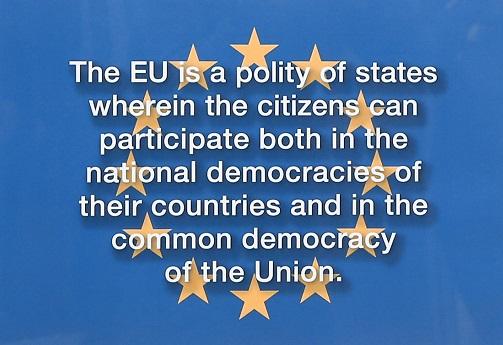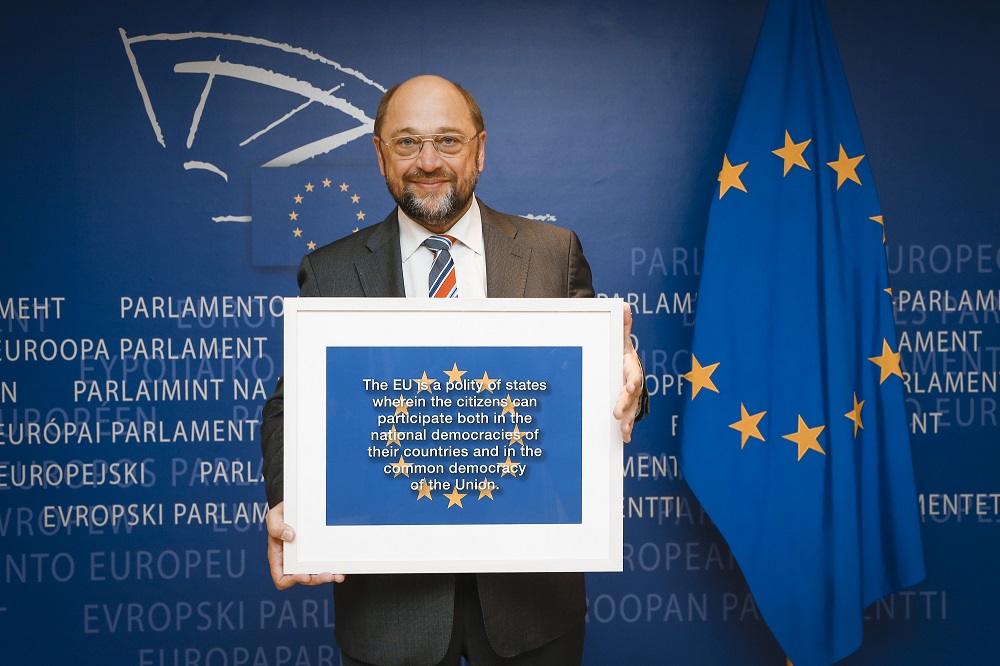The question concerning the nature of the EU has been one of the most contested political and academic issues of the last fifty years. From the outset, the debate about European integration has been dominated by the dilemma as to whether the project should result in the emergence of a sovereign state of Europe or in the formation of a Europe of sovereign states. This line of thought leads to the suggestion that, anno 2014, the identity of the EU may be described with the following words: the EU is a Union of citizens and member states which functions as a common democracy.
Guest blog by Jaap Hoeksma, Philosopher of Law, Director of Euroknow and Creator of the Boardgame Eurocracy
The question concerning the nature of the EU has been one of the most contested political and academic issues of the last fifty years. From the outset, the debate about European integration has been dominated by the dilemma as to whether the project should result in the emergence of a sovereign state of Europe or in the formation of a Europe of sovereign states. According to the advocates of a federal Europe, the old continent had to overcome the enmities of the past by merging into a single European state in analogy to the United States of America. The Italian politician Altiero Spinelli even held that this process would have to happen overnight. In his Big Bang-theory the citizens would go to sleep as Belgians, Danes or Germans and wake up the next morning as Europeans. While other proponents adopted a more cautious approach by arguing that integration should take place on a step-by-step basis, they shared the conviction that Europe had a federal vocation. This vision was updated and reinvigorated by the -then- German minister of Foreign Affairs Joschka Fischer in his lecture 'From Confederacy to Federation' delivered at the Humboldt University in Berlin on 12 May 2000.
Opposing the federal view, President de Gaulle of France argued in favour of a 'Europe of Nation-States'. In his concept of l'Europe des Patries, the member-states would retain their right of veto under all circumstances. In 1966 he went so far as to suspend French cooperation in order to convey the message that the Republic of France would not be bound by majority voting against her will. Although De Gaulle blocked the accession of the United Kingdom to the European Communities, his concerns about the decline of the nation-states were voiced with similar passion by British Prime-Ministers Margareth Thatcher in 1988 and David Cameron in 2013. Over the years, the divisions between the antagonists about the end goal or finalité politique of the project of European integration became so entrenched that progress could only be made if and as long as the end goal was not mentioned. The so-called paradox of the finalité politique exemplifies a stalemate in the discussion about the nature of the EU and the future of European integration.
As recently as 2005 the Belgian political theorist Paul Magnette published a comprehensive study on this subject under the title: What is the European Union? In the concluding chapter Magnette argued that three scenarios for the future of the EU can be envisaged: either a federal-type regime or an intergovernmental Union or something in between. In a rare twist of logic the author refrained from answering the question he posed in the title of his book.
Ten years and a financial crisis later, however, it may be suggested that the development of the EU has its own dynamics which can no longer be explained in the terms of the Westphalian system of international relations. Rather than becoming either a state or a union of states, the EU is evolving from a common market towards a common democracy. The gist of this blog is to portray the EU in post-Westphalian terms as a 'Union of citizens and member states'. In the same vein it can be established that the EU constitutes a new paradigm in international governance inasmuch as the Union functions as a common democracy. This line of thought leads to the suggestion that, anno 2014, the identity of the EU may be described with the following words: the EU is a Union of citizens and member states which functions as a common democracy.
Martin Schulz, European Parliament President
Ever since its foundation by virtue of the Treaty of Maastricht in 1992, the EU has been criticised by politicians and scholars alike for its democratic deficit. In doing so, many critics have overlooked the fact that the EU is the only regional international organisation with democratic aspirations. Fortunately, the new approach to the EU sheds fresh light on this protracted debate. Given the fact that the EU does not only consist of states, but also of citizens, it has become feasible to draft a Citizens' Definition of the EU. In my previous blog I disclosed that the Citizens' Definition has been presented to the European Parliament during the finals of the EU Democracy Tour in May 2014. At the start of the new parliamentary term it has also been advanced by the previous and incoming President of the European Parliament Martin Schulz. In his acceptance speech of July 2d President Schulz responded to the normative challenge contained in the Citizens' Definition by promising to enhance the democratic functioning of the EU.

